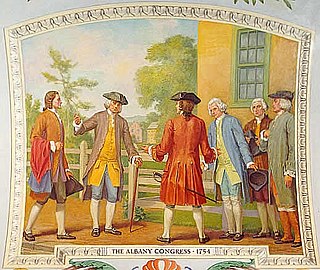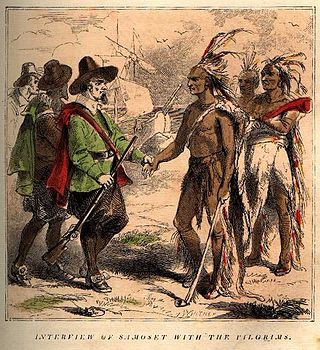Related Research Articles

The Thirteen Colonies were a group of British colonies on the Atlantic coast of North America during the 17th and 18th centuries. Grievances against the imperial government led the 13 colonies to begin uniting in 1774 and expelling British officials by 1775. Assembled at the Second Continental Congress in Philadelphia, they appointed George Washington as commander-in-chief of the Continental Army to fight the American Revolutionary War. In 1776, Congress adopted the Declaration of Independence as the United States of America. Defeating invading British armies with French help, the Thirteen Colonies gained sovereignty with the Treaty of Paris in 1783.

The Stamp Act 1765, also known as the Duties in American Colonies Act 1765, was an Act of the Parliament of Great Britain which imposed a direct tax on the British colonies in America and required that many printed materials in the colonies be produced on stamped paper from London which included an embossed revenue stamp. Printed materials included legal documents, magazines, playing cards, newspapers, and many other types of paper used throughout the colonies, and it had to be paid in British currency, not in colonial paper money.

The Albany Congress, also known as the Albany Convention of 1754, was a meeting of representatives sent by the legislatures of seven of the British colonies in British America: Connecticut, Maryland, Massachusetts, New Hampshire, New York, Pennsylvania, and Rhode Island. Those not in attendance included Newfoundland, Nova Scotia, New Jersey, Virginia, Georgia, North Carolina, and South Carolina. Representatives met daily at the City Hall in Albany, New York, from June 19 to July 11, 1754, to discuss better relations with the Native American tribes and common defensive measures against the French threat from Canada in the opening stage of the French and Indian War, the North American front of the Seven Years' War between Great Britain and France.

The colonial history of the United States covers the period of European colonization of North America from the early 17th century until the incorporation of the Thirteen Colonies into the United States after the Revolutionary War. In the late 16th century, England, France, Spain, and the Dutch Republic launched major colonization expeditions in North America. The death rate was very high among early immigrants, and some early attempts disappeared altogether, such as the English Lost Colony of Roanoke. Nevertheless, successful colonies were established within several decades.

The Middle Colonies were a subset of the Thirteen Colonies in British America, located between the New England Colonies and the Southern Colonies. Along with the Chesapeake Colonies, this area now roughly makes up the Mid-Atlantic states.

Theophilus Eaton was a wealthy New England Puritan merchant, diplomat and financier, who took part in organizing and financing the Great Puritan Migration to America. He was a founder of Massachusetts Bay Colony, and a founder and eventual governor of New Haven Colony. He also cofounded Boston, Massachusetts, Greenwich, Connecticut and Eaton's Neck in New York.

The governments of the Thirteen Colonies of British America developed in the 17th and 18th centuries under the influence of the British constitution. After the Thirteen Colonies had become the United States, the experience under colonial rule would inform and shape the new state constitutions and, ultimately, the United States Constitution.

The Province of Maryland was an English and later British colony in North America from 1634 until 1776, when it made common cause with the group of Thirteen Colonies in rebellion against Great Britain and, finally in 1781—as the 13th signatory to the Articles of Confederation—it ratified its perpetual union with that group as the state of Maryland. The province's first settlement and capital was St. Mary's City, located at the southern end of St. Mary's County, a peninsula in the Chesapeake Bay that is bordered by four tidal rivers.
The history of the Jews in Colonial America begins upon their arrival as early as the 1650s. The first Jews that came to the New World were Sephardi Jews who arrived in New Amsterdam. Later major settlements of Jews would occur in New York, New England, and Pennsylvania.

A proprietary colony was a type of colonial administration in British America during the 17th century, and in the East Indies until the 1850s. In the English overseas possessions, all land belonged to the Crown, which held ultimate authority over their management. All English colonial territories were partitioned by the Crown via royal charters into one of three types: proprietary, royal, or charter. Under the proprietary system, individuals or companies were granted commercial charters by the Crown to establish overseas colonies. These proprietors were then granted the authority to select the governors and other officials in the colony.
A charter is a document that gives colonies the legal rights to exist. Charters can bestow certain rights on a town, city, university, or other institution.

The Chesapeake Colonies were the Colony and Dominion of Virginia, later the Commonwealth of Virginia, and Province of Maryland, later Maryland, both colonies located in British America and centered on the Chesapeake Bay. Settlements of the Chesapeake region grew slowly due to diseases such as malaria. Most of these settlers were male immigrants from England who died soon after their arrival. Due to the majority of men, eligible women did not remain single for long. The native-born population eventually became immune to the Chesapeake diseases and these colonies were able to continue through all the hardships.
Colonel Nathaniel Blakiston was the 8th Royal Governor of Maryland from 1698 to 1702. He succeeded Francis Nicholson and was succeeded by Thomas Tench. He was related to Nehemiah Blakiston.

The New England Colonies of British America included Connecticut Colony, the Colony of Rhode Island and Providence Plantations, Massachusetts Bay Colony, Plymouth Colony, and the Province of New Hampshire, as well as a few smaller short-lived colonies. The New England colonies were part of the Thirteen Colonies and eventually became five of the six states in New England, with Plymouth Colony absorbed into Massachusetts and Maine separating from it.

Ames' Almanack (almanac) was the first almanac printed in the British North American colonies. While Benjamin Franklin's Poor Richard's Almanack is more widely known, the Ames' Almanack had a much larger readership. Franklin's publication had a circulation of 10,000 copies compared to 60,000 for the Ames' Almanack.
Edward Randolph was an English colonial administrator, best known for his role in effecting significant changes in the structure of England's North American colonies in the later years of the 17th century.

The English overseas possessions, also known as the English colonial empire, comprised a variety of overseas territories that were colonised, conquered, or otherwise acquired by the former Kingdom of England during the centuries before the Acts of Union of 1707 between the Kingdom of England and the Kingdom of Scotland created the Kingdom of Great Britain. The many English possessions then became the foundation of the British Empire and its fast-growing naval and mercantile power, which until then had yet to overtake those of the Dutch Republic, the Kingdom of Portugal, and the Crown of Castile.

William Parks was an 18th-century printer and journalist in England and Colonial America. He was the first printer in Maryland authorized as the official printer for the colonial government. He published the first newspaper in the Southern American colonies, the Maryland Gazette. He later became authorized as the official printer for the colonial government of Virginia. Parks was also the publisher and printer of the first official collection of the authentic 1733 set of Virginia's laws, and the first colonial publisher and proprietor of The Virginia Gazette newspaper. During his lifetime Parks established four new newspapers in the colonies. He also worked with Benjamin Franklin on several projects related to printing, most notably, the establishment of a paper mill in Virginia, the first such mill south of Pennsylvania.

Early American publishers and printers played a central role in the social, religious, political and commercial development of the Thirteen Colonies in British America prior to and during the American Revolution and the ensuing American Revolutionary War that established American independence.

Bibliography of early American publishers and printers is a selection of books, journals and other publications devoted to these topics covering their careers and other activities before, during and just after the American Revolution. Various works that are not primarily devoted to those topics, but whose content devotes itself to them in significant measure, are sometimes included here also. Works about Benjamin Franklin, a famous printer and publisher, among other things, are too numerous to list in this bibliography, can be found at Bibliography of Benjamin Franklin, and are generally not included here unless they are greatly devoted to Franklin's printing career. Single accounts of printers and publishers that occur in encyclopedia articles are neither included here.
References
- Appleton, Marguerite. "Richard Partridge: Colonial Agent," New England Quarterly Vol. 5, No. 2 (Apr., 1932), pp. 293-309 in JSTOR
- Bond Jr., Beverley W. "The Colonial Agent as a Popular Representative," Political Science Quarterly Vol. 35, No. 3 (Sep., 1920), pp. 372-392 in JSTOR
- Lonn, Ella. The Colonial Agents of the Southern Colonies (U of North Carolina Press, 1945) online edition
- Morgan, David T. The Devious Dr. Franklin, Colonial Agent: Benjamin Franklin's Years in London (1996)
- Hoffman, Ross J. S. Edmund Burke, New York Agent: With His Letters to the New York Assembly and Intimate Correspondence with Charles O'Hara, 1761-1776 (American Philosophical Society, 1956) online edition
- Tanner, Edwin P. "Colonial Agencies in England During the Eighteenth Century," Political Science Quarterly Volume 16, Number 1 (Mar., 1901), pp. 24-49 in JSTOR
Notes
- ↑ Tanner, Edwin P. (1 March 1901). "Colonial Agencies in England During the Eighteenth Century". Political Science Quarterly. 16 (1): 24–49. doi:10.2307/2140439.
- ↑ Asher, Louis Franklin (1997). John Clarke (1609–1676): Pioneer in American Medicine, Democratic Ideals, and Champion of Religious Liberty. Pittsburgh, PA: Dorrance Publishing Company. ISBN 0-8059-4040-5.
- ↑ David T. Morgan, "A New Look at Benjamin Franklin as Georgia's Colonial Agent," Georgia Historical Quarterly, Summer 1984, Vol. 68 Issue 2, pp 221-232
- ↑ Elizabeth P. McCaughey, "William Samuel Johnson, The Loyal Whig" in William M. Fowler, Jr. and Wallace Coyle, eds. American Revolution: Changing Perspectives (1979), pp 69-102
- ↑ Thorne, R. G. "SEWELL, Robert (1751-1828), of Oak End Lodge, Iver, Bucks. | History of Parliament Online". www.historyofparliamentonline.org. The History of Parliament Trust. Retrieved 20 September 2023.
- ↑ https://encyclopediavirginia.org/entries/byrd-william-1674-1744/
- ↑ https://www.jstor.org/stable/2142582?seq=2
- ↑ http://www.virginiaplaces.org/vacount/germanna.html "Graffenried introduced the miners to Colonel Nathaniel Blakiston, former governor of Maryland and the agent in London for the Virginia colony. "
- ↑ https://msa.maryland.gov/megafile/msa/speccol/sc2900/sc2908/000001/000662/html/am662--49.html "THE AGENT IN ENGLAND. This office was by its nature unavailable to residents of Maryland, and it existed on a satisfactory basis only during Colonel Nathaniel Blakiston's incumbencies, from 1702 to 1709 and from 1713 to 1721"